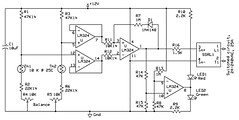
by Chesnimages
Types of Resistors
Resistors are an integral part of electricity and are so common that they are often taken for granted. Resistors operate under the principle of Ohm’s Law which applies the theory that a current running through a conductor from point A to point B is directly proportional to the voltage across the two points.
Simply put, Ohm’s law is the result of three mathematical equations illustrating the relationship between voltage, current, and electricity. Applying these equations, one can work them together to show the difference, also known as the voltage drop.
The composition resistor is the most common resistor type. These resistors are not expensive and are multi-functional. The resistance is formed by finely grounding carbon dust and combining it with graphite with a non-conductive clay powder fuses it all together. The entire mixture is shaped into a cylindrical mold that has attached metal wires at each end. These attachments provide the electrical connection. They are classed in the category of low to medium power resistors, making them a viable candidate for high frequency use.
Film resistors are made of metal film, carbon film and metal oxide film resistor types. In general, they are manufactured using pure metals which are deposited into an insulated ceramic rod. This resistor allows for closer tolerance resistance when comparing it to a more simple carbon composition resistor. These resistors have a higher ohmic value as well as much stronger temperature stability in comparison to their carbon counterpart. They produce less noise which makes them a more attractive option for high frequency applications.
Wire-wound resistors are prepared by winding a thin metal alloy wire over a ceramic former in a spiral form. It is somewhat similar to the film resistor as they both are meant for handling higher electrical currents than other types of resistors. Wire-wound resistors are mounted easily onto metal plates and heatsinks. This increases their ability to hold up against heat and will increase their capabilities.
